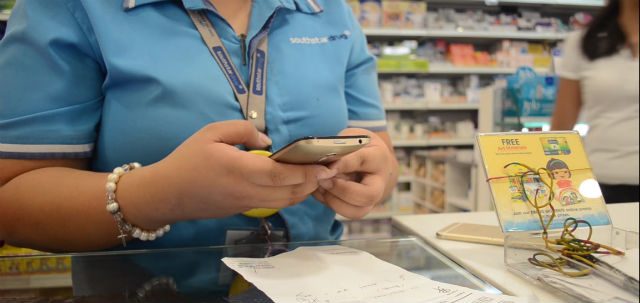SUMMARY
This is AI generated summarization, which may have errors. For context, always refer to the full article.

MANILA, Philippines – The Food and Drug Administration (FDA) is eyeing to implement this year a mobile application that will digitize the logbooks in pharmacies nationwide.
Southeast Asian healthcare data startup mClinica donated the FDA Electronic Logbook to the government agency. Only pharmacists and the FDA will have access to the app. (READ: Southeast Asian startup mClinica raises $6.3M for global expansion)
Farouk Meralli, mClinica chief executive officer, said the application will allow pharmacies to forego manually recording prescriptions in paper logbooks. The FDA, in turn, will have easy access to crucial public health data that could help it craft better programs.
“[Manually recording prescriptions] creates a real problem for pharmacists who are tasked with the responsibility of logging all of these information. And instead of spending time with patients, they’re spending time with paper. The FDA has a similar set of challenges in the sense that they have to supervise more than 10,000 pharmacies across 7,000 islands,” Meralli told Rappler.
“So what we thought about [is] how we could digitize this prescription logbook. And in real time provide all of these information from across the country in a centralized manner and help the FDA with decision-making and information to take action to help the FIlipino people,” he said.
The FDA and mClinica conducted a pilot testing of the app in 56 pharmacies in Metro Manila earlier this year.
They discovered that most tuberculosis patients in these pharmacies only buy 30 tablets out of the needed 160 to 180 tablets needed to complete their treatment. The same goes for antibiotics, wherein patients only buy one to 6 pills out of the total 21 pills usually prescribed by doctors.
“We are starting to understand how disease like tuberculosis are treated in the private sector, how patients actually take their medicine, how they stay on treatment, or in this case, don’t stay on treatment. And that helps us solve the underlying causes of TB in this country,” said Meralli.
FDA director general Nela Charade Puno said they are hoping to begin rolling out the Electronic Logbook app by the end of the year. For now, they are still ironing out some details regarding the donation status of the app.
“It’s in its final stages. It’s a matter of basically just looking at the legalities of it. Because it is a donation, so we do not rush the whole thing,” she said.
Fighting counterfeits, helping disaster teams
The FDA Electronic Logbook app will give real-time alerts to pharmacies when a particular medicine is recalled by the FDA as well.
“The other thing it helps us to understand is really things like counterfeit, making sure that the supply chain is clean and safe for Filipinos nationwide. We have the ability now to detect what counterfeits are being distributed in the pharmaceutical supply chain and ensure that these are stamped down,” said Meralli
Puno added the Electronic Logbook app will also help government response teams in times of disasters. The app will make it easier to determine the availability of drugs per pharmacy, per area.
“If we have this app available, it will be easy for all these rescuers to identify which pharmacies have these important antibiotics or life-saving drugs, which areas can they access to provide these to all those who need it during emergency situations,” she said.
For Paulo Martin Santos, FDA chief technology innovation officer, the FDA Electronic Logbook will help them provide the right medicines to Filipino households.
“In a nutshell, it’s more of a safer community because you get to buy the right medicine for you. We will be able to protect you by tracking down [the movement of the drug] from one drug store and the consumer,” he said.
“If the consumer buys that drug from an unregistered establishment, we should be able to protect them from not buying from those types of stores,” Santos added. – Rappler.com
Add a comment
How does this make you feel?
There are no comments yet. Add your comment to start the conversation.